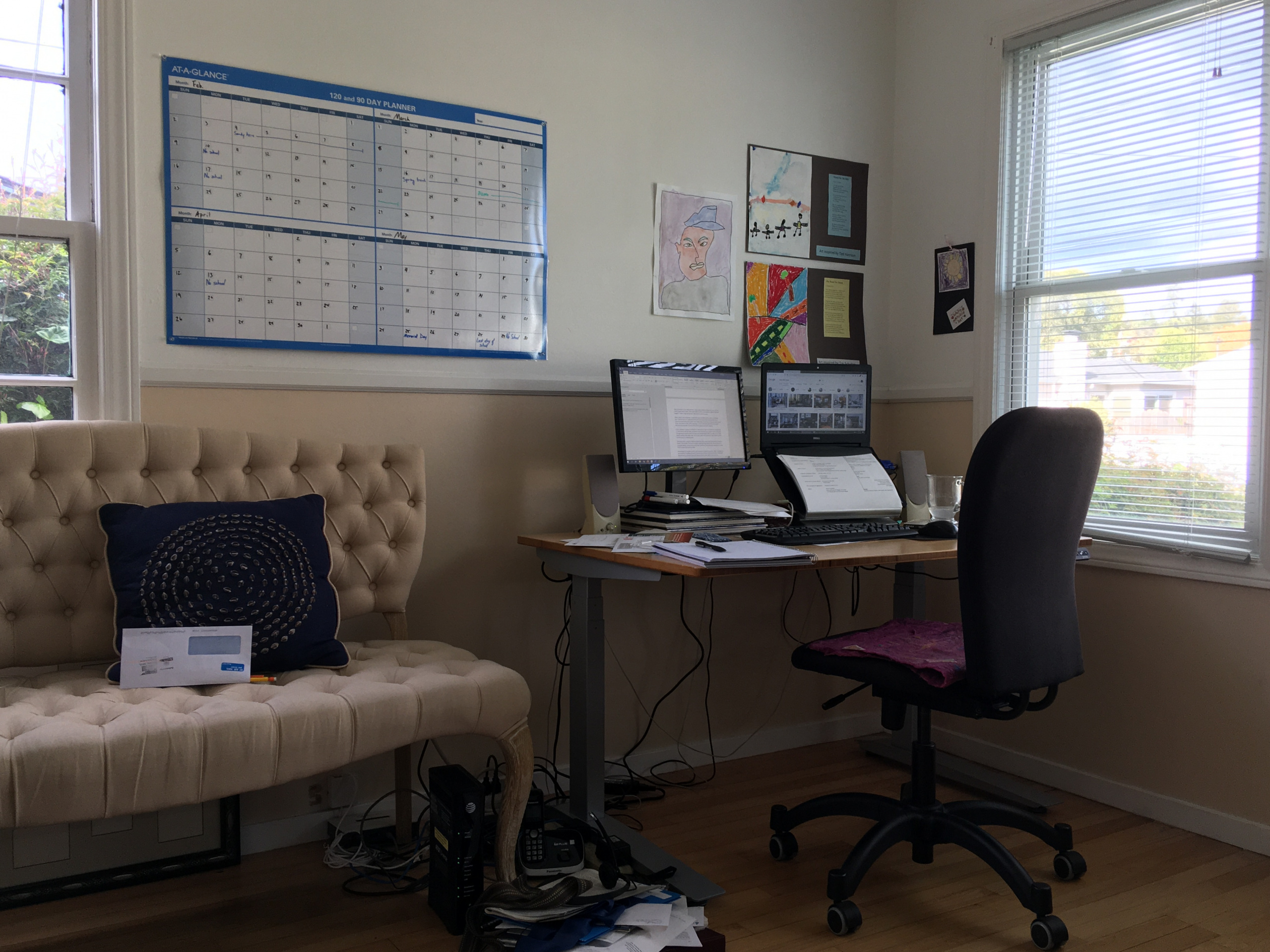
Tips for working from home, from some folks who already do it
A handful of Frontier Group staff have regularly worked from home in recent years. As millions of Americans begin working from home temporarily, veteran work-from-home staff shared some tips on how they’ve grappled with the challenges of working away from an office.

We all know the benefits of working in an office: you can collaborate more easily with your coworkers, you enjoy a sense of camaraderie, and casual conversations can lead to new campaign ideas. However, a handful of Frontier Group staff have regularly worked from home in recent years. As millions of Americans begin working from home temporarily, veteran work-from-home staff shared some tips with me on how they’ve grappled with the challenges of working away from an office.
Is your space working too? It’s worth spending a bit of time to make sure your physical set-up is comfortable. Do you need a new desk chair? Would your computer be more comfortable if the screen were higher? Over the years, my home office set-up has evolved. I started with a second-hand desk and a cheap chair. I added an external keyboard and used a stack of high school yearbooks to elevate my laptop screen. I upgraded the chair. I bought a better headset for phone calls and webinars. Each improvement was relatively inexpensive and has made the work-from-home experience more comfortable and productive.
Resist the demons. Working from home can be lonely. You’ll want to deliberately seek out opportunities to connect with people. Susan likes to open a Google Hangout with a coworker for an hour as they both work on their own projects. Plan your phone calls so that you have a few each day. Schedule a phone call after work with a friend you haven’t talked to in a while. Make a date to eat dinner with your roommate.
Move your body… outdoors. Even during this coronavirus pandemic, working from home doesn’t mean you should never leave the house. Susan highly recommends going for a walk outside every day, even if it is just 15 minutes to walk around the neighborhood. It’ll make you feel better physically and mentally.
Enjoy the comforts of a stocked fridge. The beauty of working from home is you can have last night’s soup for lunch without worrying it will spill in your bookbag, and you can toast your side of bread instead of eating it cold.
Office-casual beats sweats. If you find yourself losing motivation, dress up! Ditch the loungewear and dress as if you were going to your regular office. Putting on a blazer can help remind you that you are a professional doing meaningful work. My mom, who in retirement spends most of her time in the garden but sometimes needs to write essays for the local chamber music society, puts on makeup to remind herself that she’s doing something for a bigger audience than when she’s just writing an email to a friend.
Boundaries? Or no boundaries? This depends… on your personality and your stage of life. If you have a family, they probably need some of your attention right now, and the best way to meet their needs and still get stuff done will be to tell them when you’re going to be available (and implicitly, when you’re not). In that case, set a clear line between work and not-work. Start your work day at a set time and have a plan for when you’re going to call it a day. On the other hand, if you don’t have kids, or yours are grown, and you’re motivated to spend more time, you may find that the absence of a commute (and some sort of office set-up at home) makes it more likely that you’ll grab ideas and use them when they occur to you. Susan loves that; she says “it makes me feel like I’m 25, and I can do whatever the heck I want – and sometimes that’s WORK!”
Plan. This is always a good practice, but it’s especially good when you’re working at home. Have a clear plan, with goals, for your day and week. If I feel myself slipping from my plan, I ask myself “what do I need to accomplish in order to sleep well tonight?” Frontier Group staff also do a daily check-in about our goals.
Office hours. Make it clear to your roommates or family when you’re working and they need to not disturb you. At the same time, cut your roommates and family some slack if they forget and interrupt. This new set-up requires adjustments from everyone.
Play nicely in the sandbox. If your roommate or spouse is working from home and is loud on the phone, you might need to work out some arrangement about who has to go to another room during calls. If you’re both already working at the dining table, can you put a chair in the bedroom or clear off the top of the dresser to use as a standing desk?
Develop a tolerance for the mess. Remember how in college everybody cleaned their dorm rooms before they started studying for exams? Don’t do that. Train yourself to ignore the dirty dishes in the sink and the pile of unwashed laundry, at least during work hours. Another work-from-home veteran told me she feels better about ignoring it if she makes a list of chores that need to be done later.
That’s our list of tips. Mostly it helps to acknowledge both the challenges and the advantages, and know when to fight back against the former by reaching out to other humans, and when to embrace the latter (such as a slice of leftover chocolate cake for an afternoon snack).
Topics
Authors
Elizabeth Ridlington
Associate Director and Senior Policy Analyst, Frontier Group
Elizabeth Ridlington is associate director and senior policy analyst with Frontier Group. She focuses primarily on global warming, toxics, health care and clean vehicles, and has written dozens of reports on these and other subjects. Elizabeth graduated with honors from Harvard with a degree in government. She joined Frontier Group in 2002. She lives in Northern California with her son.
Find Out More

Choose forward.

Essential workers: Unpaid caregivers and the future of work

Nowhere safe to rest: Nursing homes in the pandemic

